Use of the n-word in ‘Ma Rainey’s Black Bottom’
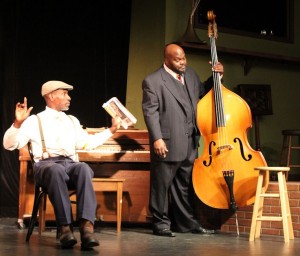 On stage now through March 11 in the Foulds Theatre at the Alliance for the Arts is Theatre Conspiracy’s production of August Wilson’s Ma Rainey’s Black Bottom. Some audience members may find Wilson’s dialogue off-putting because he liberally peppers his characters’ jargon with the n-word. In fact, he uses it 65 times.
On stage now through March 11 in the Foulds Theatre at the Alliance for the Arts is Theatre Conspiracy’s production of August Wilson’s Ma Rainey’s Black Bottom. Some audience members may find Wilson’s dialogue off-putting because he liberally peppers his characters’ jargon with the n-word. In fact, he uses it 65 times.
Most blacks and whites agree that whites cannot use the n-word without sounding racist, bigoted or, 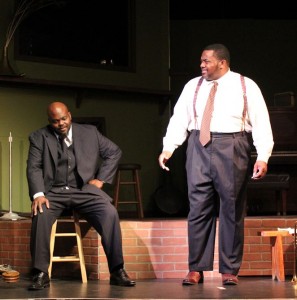 at the very least, tone-deaf (although Justin Bieber got a pass for using the term in a song not too long ago because of his age and the song’s context). But the African-American community is divided on whether it’s dope or lame for blacks to use the term themselves. For example, Oprah Winfrey and the late Maya Angelou have both taken blacks to task for using the word, even as a term of endearment or camaraderie. But recognizing that the n-word is part of the lingo of most African-Americans, especially younger blacks, rappers from Ja Rule to Kayne
at the very least, tone-deaf (although Justin Bieber got a pass for using the term in a song not too long ago because of his age and the song’s context). But the African-American community is divided on whether it’s dope or lame for blacks to use the term themselves. For example, Oprah Winfrey and the late Maya Angelou have both taken blacks to task for using the word, even as a term of endearment or camaraderie. But recognizing that the n-word is part of the lingo of most African-Americans, especially younger blacks, rappers from Ja Rule to Kayne 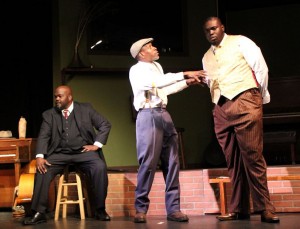 and hip hop artists like The Weeknd refer to themselves and others as “niggas” without reservation or hesitation.
and hip hop artists like The Weeknd refer to themselves and others as “niggas” without reservation or hesitation.
In fact, the subject came up just last year in the course of a collaboration between Kayne and former Beatle Paul McCartney. West employed n-word some 40 times in the lyrics he wrote for a tune McCartney penned in 1969 under the title All Day. 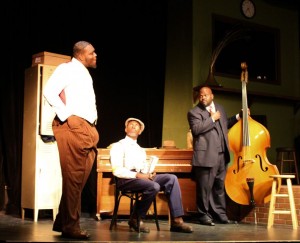 Sir Paul shrugged off admonitions that he distance himself from West and the song, saying “he’s talking about an urban generation that uses that word in a completely different way. It’s the context. So I was actually pleased with it.”
Sir Paul shrugged off admonitions that he distance himself from West and the song, saying “he’s talking about an urban generation that uses that word in a completely different way. It’s the context. So I was actually pleased with it.”
And context is why August Wilson makes use of the n-word in Ma Rainey’s Black Bottom.
Still, Theatre Conspiracy director Sonya McCarter and assistant 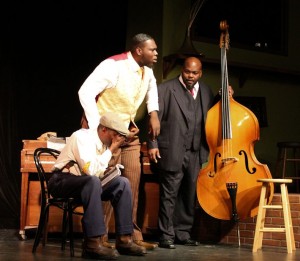 director Tera Nicole Miller are including an insert in the playbill for the show to explain Wilson’s use of the word and their decision to remain true to the script notwithstanding the visceral reaction some audience members may experience upon hearing its use. It’s an insightful piece of writing, and so Art Southwest Florida is reproducing it here in full. This is what McCarter and Miller want you to know:
director Tera Nicole Miller are including an insert in the playbill for the show to explain Wilson’s use of the word and their decision to remain true to the script notwithstanding the visceral reaction some audience members may experience upon hearing its use. It’s an insightful piece of writing, and so Art Southwest Florida is reproducing it here in full. This is what McCarter and Miller want you to know:
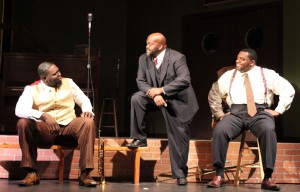 “In an interview with the Paris Review, August Wilson related the importance of allowing his characters to speak their language and tell their stories without censor. ‘The characters want to explain, as most people do, their entire history and philosophy, their take on the world and the vagaries of life.’
“In an interview with the Paris Review, August Wilson related the importance of allowing his characters to speak their language and tell their stories without censor. ‘The characters want to explain, as most people do, their entire history and philosophy, their take on the world and the vagaries of life.’
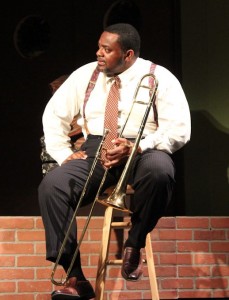 “What do we do, then, about use of the ‘N- word’ prevalent in Wilson’s plays (used 65 times in Ma Rainey’s Balk Bottom alone)? How do we give audience to a play with a word that promotes negativity and incites feelings of pain and anger? The answer may be found in understanding the origins of the play and the word itself.
“What do we do, then, about use of the ‘N- word’ prevalent in Wilson’s plays (used 65 times in Ma Rainey’s Balk Bottom alone)? How do we give audience to a play with a word that promotes negativity and incites feelings of pain and anger? The answer may be found in understanding the origins of the play and the word itself.
“Wilson’s inspiration for Ma Rainey’s Black Bottom came from the stories told by old black men in a cigar bar he frequented as a young adult. ‘I just loved to hang around those old guys – you got philosophy about life, what a man is, what his duties, his responsibilities are. It’s where I learned how black people talk.’
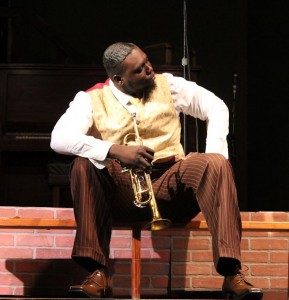 For Wilson, the uncensored language of these men fueled his desire to ‘raise consciousness [of the black experience] through theater’ [quoted in Review]. In order to write about the black experience, tell his story and the stories of those who came before him, Wilson chose to use language that speaks to a shared history (both good and bad) and comments on the effects of that history.
For Wilson, the uncensored language of these men fueled his desire to ‘raise consciousness [of the black experience] through theater’ [quoted in Review]. In order to write about the black experience, tell his story and the stories of those who came before him, Wilson chose to use language that speaks to a shared history (both good and bad) and comments on the effects of that history.
“Dictionary.com defines ‘nigger’ as ‘an offensive term for a black person.’ The word, earlier in history, simply identified people who were not white: nigrum (Latin), 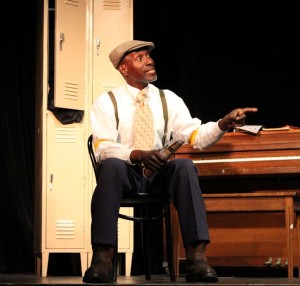 negre (French), negro (Spanish), all meaning black. The African-American Registry reveals the word nigger as ‘the phonetic spelling of the white southern mispronunciation of Negro.’
negre (French), negro (Spanish), all meaning black. The African-American Registry reveals the word nigger as ‘the phonetic spelling of the white southern mispronunciation of Negro.’
“No matter its origins, by the early 1800s, the word nigger was established as a derogatory word as a ‘term of exclusion, a verbal reason for discrimination. The N-word reinforces the long-held perception (by some) of African-Americans as slothful, ignorant, filthy and inconsequential. Surely 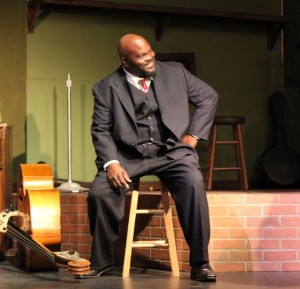 a word so degrading should only be used as an historical recounting, through education or art, of the African-American experience.
a word so degrading should only be used as an historical recounting, through education or art, of the African-American experience.
“Why then do some African-Americans use this offensive word? That question is, and will continue to be, debated for some time. Anndretta Wilson asserts in her thesis from UCLA that ‘for Wilson’s characters, the use of the N-word, even in dialogue that is not about race, is linked to both the madness of racism and the maddening effects on 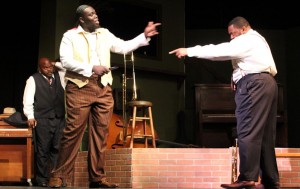 those who endure, discuss, and remember racial inequality.’
those who endure, discuss, and remember racial inequality.’
How do we give audience to a play with a word which promotes negativity and incites feelings of pain and anger? Anndretta suggests a more expansive rumination which takes into consideration the tone, intent, emphasis, 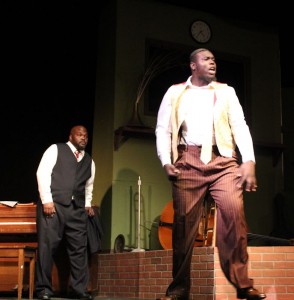 expression and mannerisms of the one speaking. ‘We might consider that the meaning of the N-word is made through its delivery rather than by a fixed definition. […] the N-word is an audible act that conveys meaning specific to each use.’”
expression and mannerisms of the one speaking. ‘We might consider that the meaning of the N-word is made through its delivery rather than by a fixed definition. […] the N-word is an audible act that conveys meaning specific to each use.’”
Or as Paul McCartney put it in connection with Kayne West – “context” – meaning which varies, depending on the speaker’s mood or intent, as a form of camaraderie, as a term of endearment or admonition. Clearly, it’s a concept that whites, particularly older whites, may struggle with, but one that’s second nature to people of color.
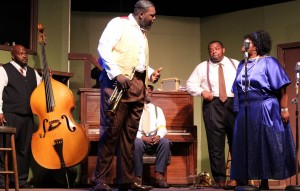 “Hopefully the language of Ma Rainey’s Black Bottom will not overshadow that which is common to all: love, beauty, betrayal, survival, self-discrimination and honor,” express McCarter and Miller in their insert.
“Hopefully the language of Ma Rainey’s Black Bottom will not overshadow that which is common to all: love, beauty, betrayal, survival, self-discrimination and honor,” express McCarter and Miller in their insert.
To the contrary, the language August Wilson uses elucidates the black experience, both then and 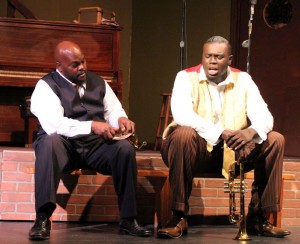 now. In fact, it’s likely that the play would not convey the same message or emotions had Wilson, McCarter or Miller stripped the n-word from the characters’ dialogue in some misguided notion of political correctness.
now. In fact, it’s likely that the play would not convey the same message or emotions had Wilson, McCarter or Miller stripped the n-word from the characters’ dialogue in some misguided notion of political correctness.
February 25, 2017.
RELATED POSTS.
- Theatre Conspiracy’s ‘Ma Rainey’s Black Bottom’
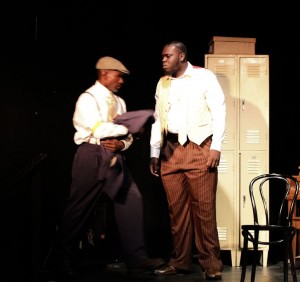 brilliantly written, thoughtfully directed, powerfully performed
brilliantly written, thoughtfully directed, powerfully performed - With ‘Ma Rainey’s Black Bottom,’ Theatre Conspiracy takes us into world of 1920s black Blues musicians
- Cantrella Canady is Ma Rainey in new Theatre Conspiracy play
- Cicero McCarter is Slow Drag in ‘Ma Rainey’s Black Bottom’
- Elvis Mortley is piano man Toledo in ‘Ma Rainey’s Black Bottom’
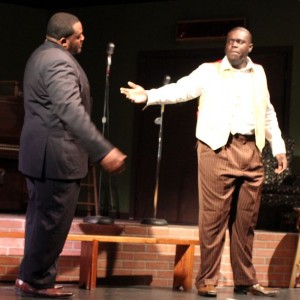 Patrick Day is music producer Sturdyvant in ‘Ma Rainey’s Black Bottom’
Patrick Day is music producer Sturdyvant in ‘Ma Rainey’s Black Bottom’- ‘Ma Rainey’ play dates, times and ticket information














 Tom Hall is both an amateur artist and aspiring novelist who writes art quest thrillers. He is in the final stages of completing his debut novel titled "Art Detective," a story that fictionalizes the discovery of the fabled billion-dollar Impressionist collection of Parisian art dealer Josse Bernheim-Jeune, thought by many to have perished during World War II when the collection's hiding place, Castle de Rastignac in southern France, was destroyed by the Wehrmacht in reprisal for attacks made by members of the Resistance operating in the area. A former tax attorney, Tom holds a bachelor's degree as well as both a juris doctorate and masters of laws in taxation from the University of Florida. Tom lives in Estero, Florida with his fiancee, Connie, and their four cats.
Tom Hall is both an amateur artist and aspiring novelist who writes art quest thrillers. He is in the final stages of completing his debut novel titled "Art Detective," a story that fictionalizes the discovery of the fabled billion-dollar Impressionist collection of Parisian art dealer Josse Bernheim-Jeune, thought by many to have perished during World War II when the collection's hiding place, Castle de Rastignac in southern France, was destroyed by the Wehrmacht in reprisal for attacks made by members of the Resistance operating in the area. A former tax attorney, Tom holds a bachelor's degree as well as both a juris doctorate and masters of laws in taxation from the University of Florida. Tom lives in Estero, Florida with his fiancee, Connie, and their four cats.